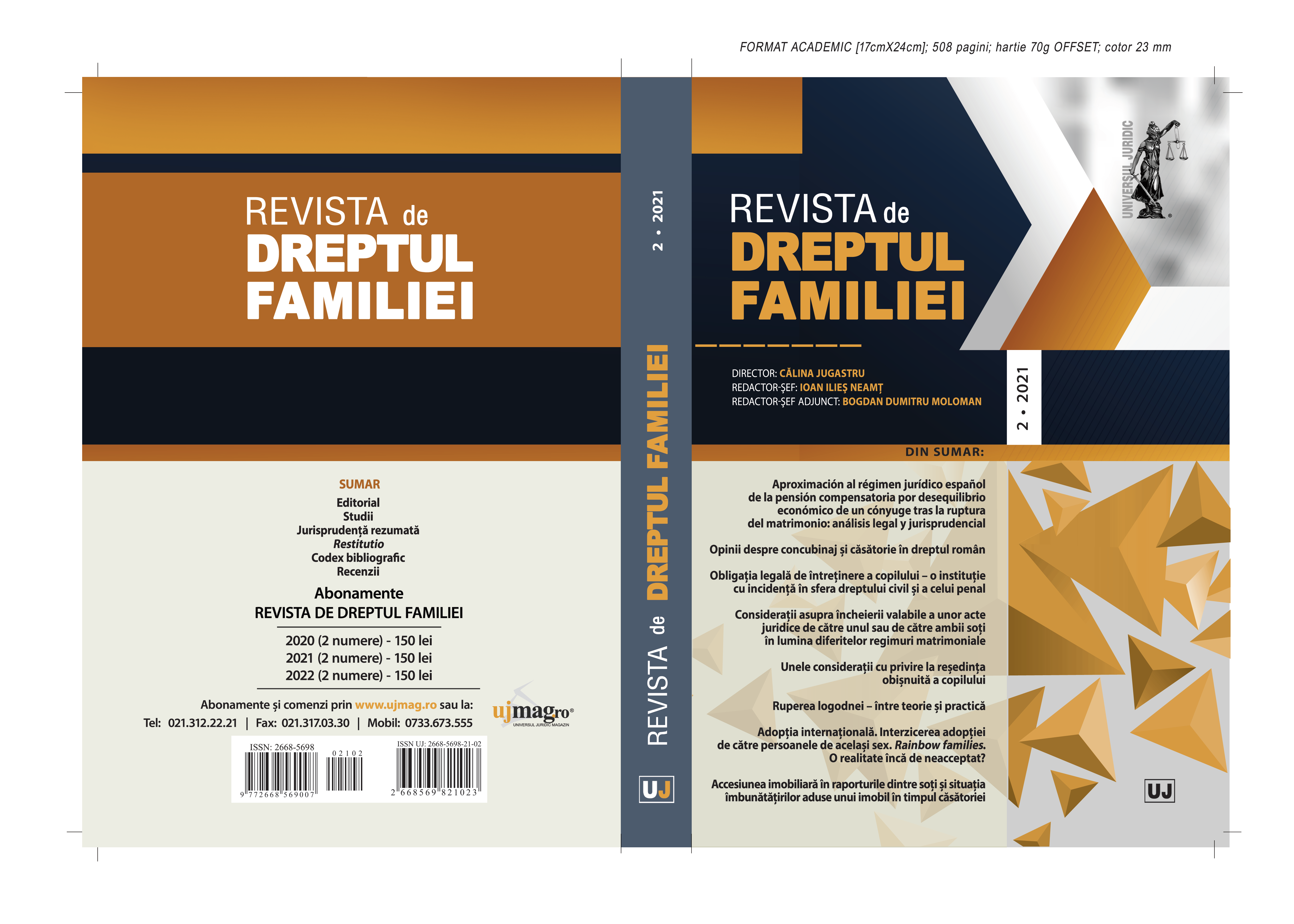Adopţia internaţională. Interzicerea adopţiei de către persoanele de acelaşi sex. Rainbow families. O realitate încă de neacceptat?
International adoption. Banning of adoption by same-sex couples. Rainbow families. A still unacceptable reality?
Author(s): Carmen Oana MihăilăSubject(s): Law, Constitution, Jurisprudence, Civil Law
Published by: Universul Juridic
Keywords: international adoption; best interest of the child; National Authority for the Rights of Persons with Disabilities; Children and Adoptions; LGBT+ persons; ECHR; discrimination;
Summary/Abstract: Divided into two parts, the present paper begins with a comprehensive insight into the institution of international adoption, which despite being an alternative solution to domestic adoption, still appeals to a small group of people. The second part of the article focuses on the international adoption by the LGBT+ persons or same sex couples. The international adoption of a child with the main residence in Romania by a person/family with the main residence in a different country can only be carried out if the child is registered with the National Authority for the Rights of Persons with Disabilities, Children and Adoptions and only in the following cases: the adoptive person or either spouse of the adoptive family are relatives within the fourth degree of kinship with the child that the adoption proceeding has been approved for, the adoptive person or either spouse of the adoptive family also has Romanian citizenship, the adoptive person is spouse of the birth parent of the child in question. This part of the paper particularly approaches the adoption requirements and special proceedings (preliminary proceedings, assessment/certification, initiation of the international adoption process, matching between the child and adoptive person/family, consent to international adoption, effects of international adoption, post adoption monitoring and even some sanctions). Moreover, another key element in international adoption is an adopted child’s right to be informed about the adoption, stipulated even by the European Human Rights Court which holds that every child has the right to know his origins, a right that derives from the notion of private life. According to Article 462 para. (3) of the Romanian Civil Code, the adoption of children by same sex persons is banned in Romania. Under the current legislation, two persons can adopt a child simultaneously or successively only in case they are spouses. The adoption of children by same sex persons has become an international legal and ethical challenge. When it comes to Romania, the debate could even be regarded as an act of bravery considering the recent referendum on a new definition of marriage to be used by the Constitution. On the other hand, even in conservative countries, lately there has been a growing interest in the rights of LGBT+ persons in general, and their right to become parents in particular. Since the Recommendation of the Committee of Ministers of 2010, in Europe more and more countries have been authorizing joint adoptions (from 8 to 17 states) and adoptions by the second parent (from 11 to 18 states) for LGBT+ persons, considering that in 2021 Europe was declared an “LGBTIQ free zone”. In the report of 2011, the Commissioner for Human Rights of the Council of Europe recommended the European countries to grant the same sex couples the same adoption rights and benefits as to the other couples, so that adoption also becomes an option for LGBT+ persons. The European Court of Human Rights held that the institution of marriage is meant “to offer a family to a child, not a child to a family”; therefore, in case the best interest of the child contradicts the interests of the adoptive persons, the best interest of the child shall prevail. In many decisions emphasized within the present paper, the Court has considered that the sentences which denied adoption to same sex couples contravened the provisions of the Convention and that sexual orientation should never become a decisive criterion in rejecting an adoption application. The last part of the paper highlights conclusions extracted from various studies which analyze the effects of child upbringing by same sex persons or couples, along with pros and cons of this form of adoption.
Journal: Revista de dreptul familiei
- Issue Year: 2021
- Issue No: 2
- Page Range: 279-314
- Page Count: 36
- Language: Romanian
- Content File-PDF

